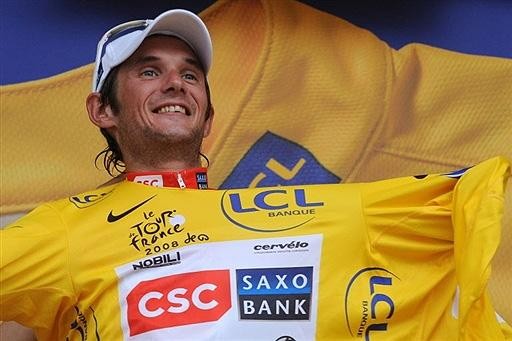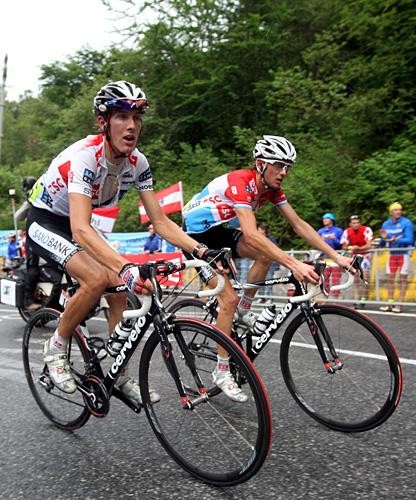Schleck inches closer to goal
After six days of riding just one second from the yellow jersey, Fränk Schleck finally gained the...


Tour de France News feature, July 21, 2008
After six days of riding just one second from the yellow jersey, Fränk Schleck finally gained the coveted garment in Prato Nevoso, Italy. The CSC-Saxo Bank team played a tactical battle with its two leaders, Carlos Sastre and Schleck, using the renewed climbing strength of Schleck's younger brother Andy to put the morning's leader Cadel Evans into difficulty.
Schleck made his first step at putting himself into yellow jersey contention on stage ten to Hautacam, where he attacked the group of Evans to gain back all but one second of the time he lost in the stage four time trial. His second step came on Sunday's stage 15, where he attacked in the final kilometre to gain nine seconds on Evans to take yellow. However, his result could also be viewed as an 18 second loss to Rabobank's Denis Menchov, who was further up the road behind Sastre.
While their tactics placed Schleck in yellow and moved Sastre 37 seconds closer to former leader Cadel Evans, CSC-Saxo Bank's two leaders will need to gain more time on Evans and Rabobank's Denis Menchov, both of whom are superior time trialists, before the penultimate day's 53 kilometre race against the clock.
To fulfil his dream of taking the overall victory in Paris, Schleck now faces the difficult prospect of taking the sole mountain top finish on l'Alpe d'Huez to gain enough time to hold the yellow jersey through the time trial. But the Luxembourg champion didn't want to think about the hard road ahead, but only wished to enjoy his moment.
"Don't kick me now that I'm happy," Schleck said. "I know that I have to gain more time on some guys, but let me enjoy it for now. I know that I'll need to attack again if I want to win the Tour. Just leave me alone," Schleck said, half-jokingly. "I missed out on the yellow jersey by only one second [on Hautacam], and finally I was able to gain back some seconds on Evans.
"It was a very hard last climb that we were climbing very fast. Carlos attacked at the foot of the climb and then my brother Andy set a fast pace that forced everybody to dig deep. Without him, the team wouldn't have been able to do this. I'm taking yellow, which is fantastic for the team. This was the tactic we had chosen this morning and it worked out well," Schleck said.
The latest race content, interviews, features, reviews and expert buying guides, direct to your inbox!
Schleck confirmed that the work of his team was the execution of a plan laid out in the morning. "This was the plan and we made it happen again, just like we did on Hautacam. We've seen Nicki [Sorensen] and Stuart [O'Grady] doing an amazing job on the flat part between the two mountains. It's great to have guys like Stuart in the team, especially since we're good friends," he said.
Talking tactics is one thing, but Schleck explained that actually executing them is a different matter. "It was really fast right from the start and I didn't have a great day, especially with the rain this morning. I came to the last climb and Andy set a tempo that was really hard.
"I noticed that Cadel was only watching me and I realized that I had to stay calm. Easily said, because I was in the hurt box, but so was everybody I hope," Schleck continued. By waiting until the very end of the stage to attack Evans, Schleck limited the amount of time he could gain, and was losing time on Menchov, who was up the road. "When Carlos attacked it made sense that we waited, since I had to do it in the last 500 metres," Schleck said.
"I had to work really hard for it, but it worked out since we now have the yellow jersey and a good classification for Carlos. Of course I knew there was a risk to let go of Menchov and Kohl, but I'm human and not a machine, so I couldn't react to everything," he explained.
"Having three riders in that group was great. Once again it showed that CSC-Saxo Bank is the strongest team," Schleck said.
Schleck may have been suffering from a touch of post-traumatic stress after watching Caisse d'Epargne's Oscar Pereiro crashed out of the race on the descent from the day's first climb, the Col Agnel. Pereiro crashed over a barrier and fell down a steep, rocky embankment in a similar fashion to Schleck's violent crash in the Tour de Suisse. "It was awful when I saw him lying there, but I'm really happy for him," Schleck said when he heard that Pereiro had broken his arm but was otherwise OK.
"He went through the same thing that happened to me in the Tour de Suisse. I was lucky to come away with it," Schleck said, recalling his tumble which resulted only in a few scrapes and bruises. "We come to a race to fight each other, but we never wish back luck for the other competitors; we're one big family."
This big family has recently discovered some black sheep, with three riders testing positive for EPO. Schleck is one of many riders who views that news as a positive for the sport. "Cycling is one of the only sports that is actually fighting against doping. The recent doping cases show that the system works; for me that is the good part," said Schleck, who turned professional in 2003.
"Now I'm going to be very happy to return to the hotel. Bjarne will surely offer us a glass of champagne and hopefully I'll have a good night sleep. It's not a secret that we'll defend the jersey, now that we finally have it. I'd like to keep it for a couple more days," 28 year-old Fränk Schleck said before walking out of the truck in his first ever yellow jersey.
